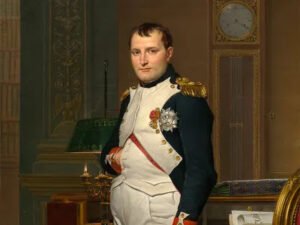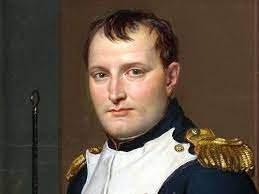Napoleon Bonaparte
In the eighteenth century one of the greatest conqueror to live was Napoleon Bonaparte. The transition from swords and spears to artillery had taken place, and Napoleon was an undisputed genius in this art of war. Although he became emperor in the name of defending revolutionary France, one can see his ambitions carried him far beyond. His personality was probably even more bizarre than the rest of the great conquerors.
Caesar considered himself to be the only messiah to his people, Alexander thought himself to be a god, Genghis was a tyrant step-overlord, while Napoleon considered himself an artist of war. He is reported to have said, I love power, but it is as an artist that I love it. To him the battlefield was a painting, and he was an artist drawing it. His power of concentration was enormous as was his memory for detail and facts. Once on a campaign in 1805, one of his subordinates could not locate his division.
While his aides searched through maps and papers, the emperor informed the officer of his unit’s present location, where he would be for the next three nights, the status and resume of the unit’s strength as well as the subordinate’s military record. This out of an army with seven corps, a total of 200,000 men, with all the units on the move. It was all pictured in his head.
He was victorious throughout parts of Europe and the Mediterranean region with his forces moving as swiftly as the wind, only louder. However, the stakes got higher and higher, the death toll mounted and the battles became even more blood-soaked. Eventually, he was defeated at the Battle of Waterloo in 1815 and was captured by the British forces. He was not sentenced to death since the British did not want him to die as a martyr.
Instead, they house-arrested him with a few of his followers in a rotten bungalow. He lived the rest of his life in constant denial of his circumstances. When he held a dinner party, men were expected to wear military dress and women appeared in evening gowns and gems. He wanted to feel like he was still ruling. Years of isolation and loneliness took a toll on him and he finally died on the 5th of May,
1821, making his last confession, France, the army, head of the army, Josephine. He basically expressed everything dear to him, his country, his military career and his wife, Josephine.


